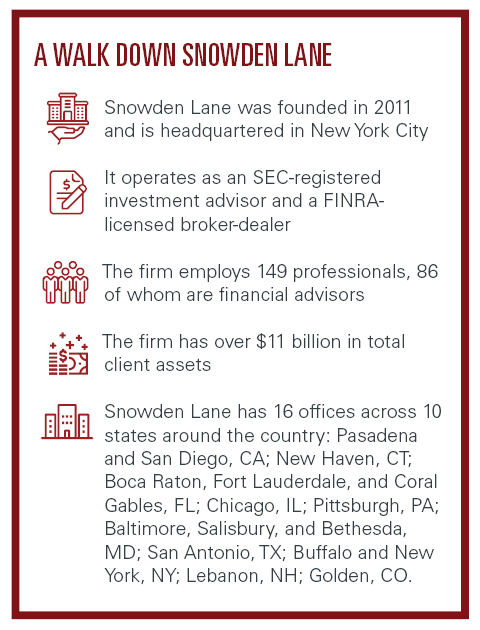

Watch out, wirehouses: Snowden Lane Partners CEO Rob Mooney is trying to steal your thunder – and your top producers, too.
After spending more than two decades as an executive managing Merrill Lynch’s famed Thundering Herd of wealth managers, Mooney helped found hybrid RIA Snowden Lane in 2011 with an insider’s knowledge of what financial advisors want and, perhaps more importantly, don’t want from an organizational overseer.
“The advisors who join Snowden Lane recognize they’re best at managing their practices and advising clients. That’s where they want to spend their time,” Mooney says.
On the flip side, he says, new recruits don’t want to spend their hours – and effort – attending to pretty much anything that’s not client-facing.
“They appreciate that Snowden Lane will provide all the necessary support in areas like operations, technology, legal and compliance, investment solutions, human resources, real estate, and everything else, while they can ultimately focus on delivering positive outcomes for clients and offering personalized service,” Mooney says.
Removing obstacles so his new herd can thunder forward has been key to Snowden Lane’s success so far, helping the firm grow to almost $12 billion in AUM in the past 13 years and increase its employee base to 149 professionals, 86 of whom are financial advisors.
“We tell advisors that joining Snowden Lane is essentially ‘self-selecting,’” Mooney says. “Once they’ve made the choice to go independent rather than joining another wirehouse, they need to decide whether to set up their own RIA, elect a 1099 model, or join a full-service boutique like Snowden Lane.”
Perhaps one reason why Mooney is so excited to get out of the way and let the wealth managers do what they do best is because he spent most of his time at Merrill doing precisely the opposite – slowing or stopping deals instead of cutting them.
Mooney rose through the ranks at the giant wirehouse dealing with the legal, compliance, regulatory, and risk management aspects of the business. In that role, he found he was always “playing defense and responding to problems.”
As CEO of Snowden Lane, he finds there are still problems to solve, but there are also points to be scored.
“To use a sports analogy, the best part of my job is getting to play offense,” says Mooney, who was at Merrill Lynch when it was acquired by Bank of America on September 14, 2008, the same weekend of the financial crisis during which Lehman Brothers was allowed to fail.
Mooney emphasizes that he was a proud member of Mother Merrill when he worked there, and still has a high regard for the brand. The key lessons he took away from the Wall Street powerhouse were the importance of leadership and “doing the right thing.” He also cites the Merrill mantra that “the client’s interest comes first.”
Nevertheless, he laments Merrill’s decline, along with that of other big-time brokerage houses, into oversized banks where the focus has become more about profiting from clients’ assets than working in their best interests. Mooney says unfortunate traits common to large firms, including bureaucracy, inefficiency, inflexibility, and conflicts of interest – the so-called “diseconomies of scale” – crept into his former organization, prompting his exit.
“We founded Snowden Lane to solve problems,” he says. “We’ve carefully cultivated our brand and we take pride in a ‘client’s interest comes first’ culture.”
He’s also proud that Snowden Lane has remained faithful to a loyalty- and partnership-driven approach to wealth management. And now that the firm has built the model, Mooney is very much enjoying watching advisors join up – especially those jumping the wirehouse ship.
“We had a very strong 2023, adding over $2 billion in client assets, recruiting six advisor teams and a dozen advisors, and adding four new offices to increase our national footprint to 16 offices in 10 states,” Mooney says. “We think 2024 will be an even better year, as we’re seeing larger – in terms of client assets – and more established advisor teams interested in making a move to full-service independence.
“We currently have the strongest recruiting pipeline in our firm’s history,” he added.
Yep – Mooney built his own financial field of dreams, and now the teams are coming. From the likes of Morgan Stanley, Merrill Lynch, UBS, JP Morgan, Raymond James, and Wells Fargo, they’re all coming.

Of course, Snowden Lane isn’t the only landing spot for advisors seeking freedom beyond the wirehouse walls. Large RIAs backed by even larger private equity houses are scooping up advisory teams all over the country. While that’s complicating Mooney’s pitch to potential Snowden Lane recruits, it’s apparently not shutting the door entirely.
“Valuations have certainly increased for the best advisor teams over the past several years; however, they’ve leveled off to some extent and we still see terrific recruiting opportunities,” he says.
For the record, Snowden saw its own infusion of PE money in January 2023, when Estancia Capital Partners backed it with a $100 million credit facility, along with Apogem Capital and Monroe Capital. And Mooney hasn’t been shy about using that dry powder to go shopping over the past year and change.
Snowden Lane picked up the $208 million Lewis-Solomon Group in February from Laidlaw & Co. And last November, former Merrill Lynch vice president William H. “Trey” Jones III joined the firm as a partner and managing director to form The Jones Group with $230 million in total client assets.
Mooney recognizes that Estancia will at some point elect to realize its own investment in Snowden Lane and secure a partner for its next chapter. Right now, however, he’s more focused on recruiting and growing the firm through the addition of top-quality wirehouse and independent advisors.
“We’ll continue to see a steady stream of advisors leaving the wirehouses as independent models are better understood by both advisors and clients,” Mooney says. “We’ll also see increasing opportunities to recruit quality advisors already in the independent market, who tried but are dissatisfied with running their own firms or are working at larger independent firms.”
So how will Snowden Lane satisfy those formerly disgruntled advisors and make them feel at home?
Part of the appeal goes back to Mooney’s time playing defense as a Merrill manager.
“We have a very flat and efficient management structure – new account and compliance approvals, operations issues, and advisor inquiries are responded to very quickly,” he says.
In addition, Mooney says Snowden Lane can provide products and services not available at large firms, like various alternative investments only available to boutiques. Finally, equity ownership is part of the transition package.
“This has been part of our model since inception, as it’s a great way to align their interest with that of the firm,” he says.

Relationships are key to our business but advisors are often slow to engage in specific activities designed to foster them.

Whichever path you go down, act now while you're still in control.

Pro-bitcoin professionals, however, say the cryptocurrency has ushered in change.

“LPL has evolved significantly over the last decade and still wants to scale up,” says one industry executive.

Survey findings from the Nationwide Retirement Institute offers pearls of planning wisdom from 60- to 65-year-olds, as well as insights into concerns.
Streamline your outreach with Aidentified's AI-driven solutions
This season’s market volatility: Positioning for rate relief, income growth and the AI rebound
